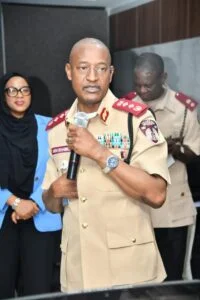The Federal Road Safety Corps (FRSC) has commenced a high-level capacity building workshop for all Patrol Team Leaders across the Federal Capital Territory (FCT) Sector Command and its units.
Declaring the workshop open on Friday in Abuja, the Corps Marshal, Malam Shehu Mohammed warned that every patrol leader must embody civility, empathy and professionalism.
The FRSC boss also stressed that the Corps under his leadership would not compromise on discipline and integrity.
The workshop is targeted at frontline leaders who interact directly with motorists, with a view to creating a ripple effect of professionalism that strengthens accountability.
Mohammed said that the initiative was aimed at enhancing discipline within the ranks, guaranteeing zero-tolerance for unethical conduct, entrenching integrity, transforming operational culture, sanitising field operations, eliminating corruption, and restoring public trust in road safety management.
He, however, directed that the training be cascaded down to all FRSC commands nationwide to ensure a uniform standard of civility and accountability across the country.
“Every patrol team leader must be an ambassador of civility and integrity; anything less is unacceptable,” he said.
Mohammed, however, said that the strategic reform was not just about training but reshaping culture and character.
He added that by empowering team leaders with the right values and tools, the Corps was building a new crop of officers who would lead by example, protect its image, and ensure safer and more orderly roads for Nigerians.
Speaking, the Assistant Corps Marshal (ACM) in charge of operations, Hyginus Omeje reinforced the principles of courtesy, accountability and zero tolerance for unethical practices.
Omeje, who spoke during the capacity development session, gave a stern warning that any officer found guilty of misconduct would face swift and decisive sanctions.
Similarly, Olusegun Ogungbemide, Assistant Corps Marshal (ACM), Corps Public Education Officer, delivered a presentation on “Safeguarding the Image of the Corps.”
Ogungbemide emphasised the need for officers to protect the organisation’s reputation through discipline and professionalism.
(NAN)



